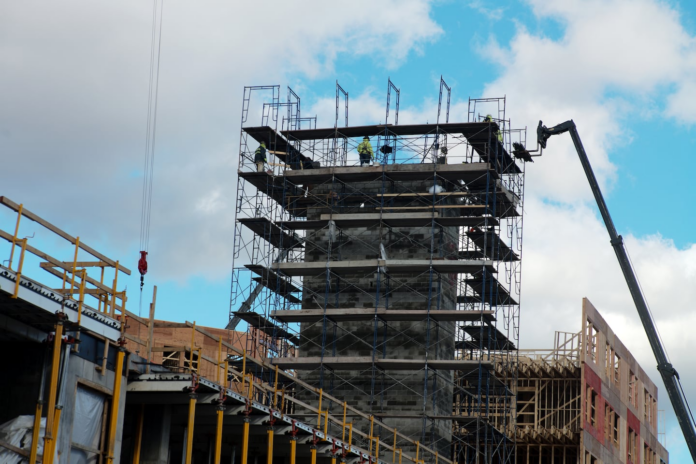It’s nowhere near the level of building experts say the region needs to put a dent in housing costs — or to grow more attractive to those considering a move here. But it’s still the first year-over-year production increase since 2021.
There were just 708 residential units permitted to begin construction in Greater Boston in September, according to the Census Bureau, which tracks an area extending into southern New Hampshire. That’s down from 725 a year prior. Through the first nine months of the year, the number of permits issued rose to 9,136, up from 8,201 a year ago but still well below prior years.
Even amid a broad push to loosen zoning and build more housing in Eastern Massachusetts, construction in Greater Boston remained relatively anemic in the first nine months of the year. But developers say there are glimmers of hope on the horizon.
Advertisement
“We’re definitely seeing people building pipeline,” said Doug Manz, a partner with Boston-based developer The HYM Investment Group, at a recent event hosted by commercial real estate publication Bisnow. While there will be some construction next year, Manz and others expect much more in 2026.
At the same event, Young Park, president of Berkeley Investments, said the housing crunch and resulting population drain is “an all hands on deck crisis” — but that “there is a certain sense of optimism” these days that hasn’t been felt in years.
One big reason why: The Federal Reserve. Higher interest rates have been a big factor in slowing construction, but the Fed in September cut the critical federal funds rate for the first time since August 2023. And it has signaled more cuts are coming.
Construction lenders and equity investors are looking for deals, Manz said. The MBTA Communities Act has helped clear a path for more housing in Massachusetts towns that have permitted little to no new housing in recent years. And the state’s $5.2 billion housing bond bill has dramatically increased funding that could galvanize projects.
Large development projects like Suffolk Downs have been slow to get off the ground amid high interest rates and construction costs. David L. Ryan/Globe Staff
While the rise of remote and hybrid work has put downward pressure on the value of commercial properties like offices, it has also opened up other markets to develop housing, developers say. More working-age adults are moving further from Boston to markets such as Lowell and Haverhill, up into New Hampshire, or down into Rhode Island.
Advertisement
“People are moving a little bit further for something that’s more cost-effective,” said John Sullivan, partner and president of architecture at SGA. “If you don’t have to commute in, there’s a lot of interest.”
The National Association of Home Builders has tracked about 340,000 apartments to be built this year across the US, down from 473,000 in 2023 and almost 550,000 in 2022 — which was the highest level since the 1980s. Interest rates play a huge role in apartment construction, and should the Fed continue to cut its key rate, the residential market should normalize in 2026, said Danushka Nanayakkara-Skillington, the NAHB’s assistant vice president for forecasting and analysis.
“Housing should get on track in 2026,” she said.
The dearth of new supply in Greater Boston is drawing deep-pocketed national investors to snap up land and other properties. Chicago-based apartment behemoth Equity Residential recently reported that it’s eyeing vacant development sites in both suburban Boston and Seattle.
Boston this year is one of Equity’s most profitable markets — and without much new competition opening soon, it will likely stay that way, Michael Manelis, the firm’s executive vice president and chief operating officer, told analysts on a recent earnings call. The company’s 7,200 apartments here already command an average rent of $3,612 per month, more than any established market it’s in except New York City.
“We like our positioning (in Boston) as our urban-centric portfolio will see very little competitive new supply for the remainder of 2024 and the full year of 2025,” Manelis said.
Advertisement
And Equity’s portfolio here is growing. The company has two projects in development now — The Basin, a 440-unit, $232 million project in Wakefield that will start leasing in late 2025, and Modera South Shore, a $122 million, 270-unit project in Marshfield that will start leasing in early 2026.
The competition isn’t limited to established apartment developers. Some companies that haven’t built much housing in the past are jumping into the residential building world as demand for office and other commercial space remains soft. Executives from BXP, the office developer formerly known as Boston Properties, last week told analysts the company owns 2,000 residential units across the country, and is looking to buy and build more.
“Our playbook in residential is going to be different from what we do with office and life science,” BXP CEO Owen Thomas said.
Some of that housing will be built where office parks now stand. BXP is actively exploring replacing some of its older suburban properties with apartments and townhomes. The company is “deep in a public re-permitting process” to replace a single-story research and development building at 17 Hartwell Ave. in Lexington with 312 apartments and hopes to kick off development early next year, BXP President Doug Linde said.
“Our BXP regional teams are spending a lot of energy pursuing alternative uses for our suburban land portfolio, which includes vacant office buildings for which the highest and best use may not be waiting for a recovery in office leasing,” Linde told analysts. “We are not going to sit around and just wait for the markets to recover.”
Catherine Carlock can be reached at catherine.carlock@globe.com. Follow her @bycathcarlock.




